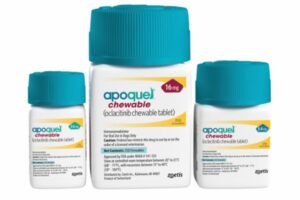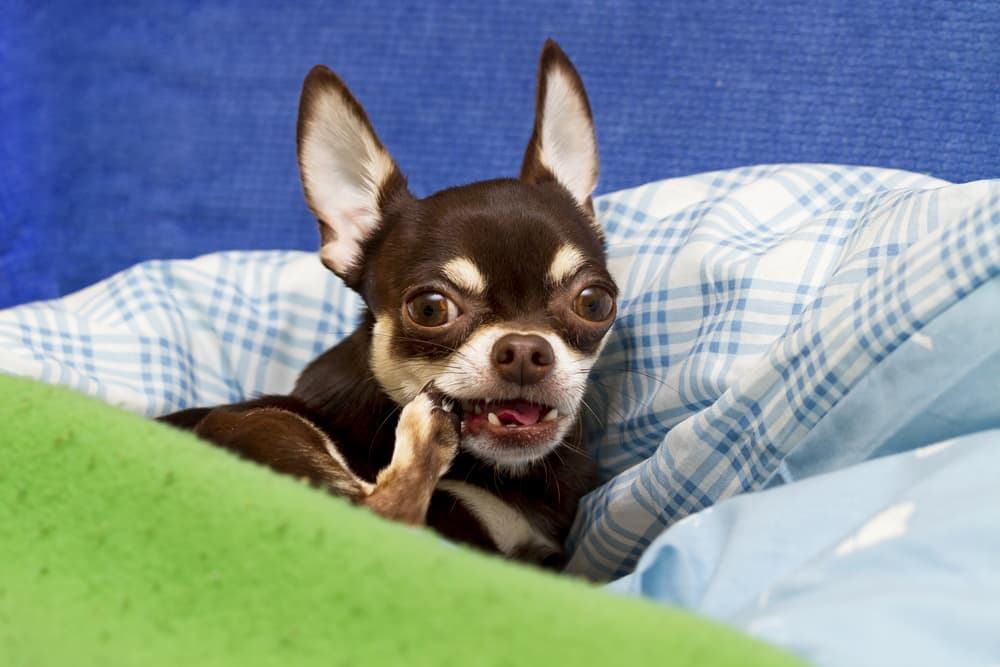Why Do Dogs Lick Their Paws? 8 Reasons and How to Help

All featured products are chosen at the discretion of the GreatPetCare editorial team and do not reflect a direct endorsement by the author or reviewer.
Dogs lick and chew on a lot of things, including themselves. But if you’re wondering why dogs lick their paws, you’re not alone. As, a veterinarian, pet parents regularly ask me about this behavior.
Paw licking can range from healthy grooming behavior to a dog coping with pain, inflammation, or discomfort.
So how do pet parents know when their dog’s paw licking and biting is problematic?
In this article, we’ll decode why dogs lick, chew, and bite their paws. I’ll also explain when it’s a problem and what pet parents can and should do about it.
Reasons Dogs Lick Their Paws and Nails
There are many reasons dogs lick and bite their paws and nails. Abnormal reasons for paw licking and chewing include:
Allergies
Dogs with allergies usually have red, itchy skin and paws. Allergies are the most common reason dogs lick at their feet. A dog suffering from allergies might do this frequently and repeatedly.
The inflammation in a dog’s paws is itchy and uncomfortable. Allergic dogs will bite, chew, and lick at their paws and nails to relieve the discomfort. These dogs will usually be gnawing on all four paws instead of just one. Allergies become worse with time.
Dogs with environmental allergies and food allergies often develop red, inflamed feet. They may start to lose fur on their paws. Environmental allergies are much more common than food allergies in dogs. Only about 10 percent of dogs suffering from allergies have a true food allergy.
Over-the-counter antihistamines are unfortunately not very effective in most dogs with allergies. However, there are anti-itch medications, like Apoquel, that can ease allergic itch. Apoquel is an oral dog allergy medicine that provides fast-acting itch relief in a tasty, pork liver flavored chewable tablet, available by prescription. Your veterinarian can help identify your dog’s allergies and recommend the appropriate treatment plan to relief your itchy pup.

Injuries
Paw and nail injuries are common. Our dogs don’t wear protective shoes like we do and are liable to hurt themselves while out and about in the world. Your dog may have irritated or cut their paw by stepping on something sharp. Dogs can also burn their paw pads when walking on hot surfaces.
Dogs sometimes step on acorns, rocks, or other small objects that become lodged between their toes. Their nails can also become torn, ingrown, or even broken.
If your dog is licking their paws due to an injury, they will be focused on one foot in particular. If this is the cause, the behavior usually starts abruptly. Dogs with an injury to their paw may or may not limp, depending on their pain tolerance and the location of the wound.
Check the top and bottom of your dog’s paw, and look between the toes, too. Minor scrapes or irritations are likely to heal with some simple, at-home first aid. But a veterinarian should examine cuts, wounds, or nail injuries. In most cases, paw injuries are not serious. With proper wound care, antibiotics, and pain medications, your dog will recover just fine.
Some dogs are very protective of their feet and may not allow you to examine their paws. In these cases, it’s best to go to the veterinarian. A professional can help check for any painful or serious problems.
Parasites
Parasites, like fleas or mange, can cause our dogs to lick and chew their paws constantly. Bites from these parasites leave the skin red and inflamed. Dogs with flea or mite infestations will often bite all four feet. You might also notice red and itchy spots on your dog’s body as well. Ticks can also cause an itching sensation. If a tick attaches to your dog’s paw or between their toes, your dog may chew at it to stop the itch and remove the tick.
These pests can be challenging to find, so just because you don’t see any parasites doesn’t mean they aren’t there. Your veterinary team can employ specialized techniques and tests to determine if parasites are causing your dog’s paw licking.
Pain
A common reason our dogs lick themselves is to alleviate pain. Dogs experiencing pain in or near their paw will regularly lick the area. This is often seen in dogs with arthritis but can occur with any painful condition involving the leg or paw.
Dogs licking their paws and nails due to pain will often focus on the specific paw that is uncomfortable. In most cases of joint pain or arthritis, there will be no obvious redness or swelling on the outside of the paws unless they lick the area raw. Your veterinarian can take radiographs (or X-rays) of your dog’s paws to confirm this cause.
Paw Pad Disorders
Dry or cracked paws can be painful and cause constant paw licking or chewing by our canines. Certain autoimmune disorders, like pemphigus, can cause painful lesions on the paw pads. In these cases, dogs are likely to bite all four paws. Other issues include paw pad corns, often seen in Greyhounds.
Treatment for these conditions will depend on the underlying cause. If your veterinarian is concerned about an autoimmune disorder, a biopsy may be needed. Corns often need to be surgically removed. Over-the-counter paw balm is usually an effective remedy for dry or cracked paws.

Infections
Bacterial and yeast infections of paw pads, nail beds, and/or skin on a dog’s feet can be another cause of paw licking.
Infections can be localized to one paw or occur on all four paws. The affected paws will usually be red, hairless, and swollen. Infected nails will often turn dark brown near the base of the nail, and pus can sometimes be seen from the nail bed.
Paw infections are often treated with antimicrobial and anti-inflammatory medication. Additionally, your veterinarian needs to determine what led to the development of the infection.
Anxiety
Overly anxious pets repeatedly lick their paws and nails to self-soothe. It can help distract them from their anxious thoughts and gives them something to fixate on. Anxious dogs usually lick their front paws. The paws typically do not have any signs of redness or outward irritation.
Dogs develop anxiety for many reasons. By working with your veterinarian or a trainer, you can find the best way to relieve your dog’s stress.
Boredom
If you and your veterinarian have ruled out health or behavioral causes of paw licking, the reason may be boredom. Bored dogs will lick, bite, and chew their paws and nails to occupy their minds. Try increasing playtime to burn off energy. You can also ramp up training sessions to satisfy your dog’s mental drive. Providing food puzzles, safe chew treats, or motorized toys can help keep attention off their paws.
Dog Paw Licking and Chewing: Is It Normal?

Occasional brief sessions of paw licking and chewing are normal dog grooming behaviors. Dogs will lick and chew their feet to clean themselves, especially after walks or play sessions. Some dogs may also exhibit this behavior as part of their nightly routine. They might lick their paws while settling into bed or throughout the day while they are relaxing.
However, if your dog has suddenly started licking or chewing their paws aggressively, it can be a sign that something is wrong. It’s also a cause for concern if your dog won’t stop licking, biting, or chewing at their feet.
Typical grooming sessions don’t last much longer than 5 to 10 minutes. Your dog should never leave themselves with raw or red paws afterward. It’s abnormal for your dog to stay up all night obsessing with their paws. Dogs also shouldn’t stop on walks or during play sessions to lick or bite their paws. These scenarios are a good reason to inspect your dog’s feet and schedule an appointment with your veterinarian.
When to Worry About Paw Licking
Every dog is different. Familiarizing yourself with your dog’s everyday habits can help you recognize when something is out of sorts.
Dogs are expected to lick their paws. But constant licking or chewing is not normal. Dogs should never bite or chew their paws so much that they leave their feet red, raw, or damaged.
Your veterinarian should address paw or nail biting, chewing, or licking if it’s beyond the realm of normal behavior. A veterinary visit is necessary if paw licking is accompanied by other symptoms. These include limping, bleeding, swelling, redness, hair loss, pain, sores, or signs of infection like odor or drainage.
How to Stop Dogs From Licking Their Paws

To stop your dog from licking and chewing their paws, you have to determine the cause of the behavior — and fix it. Parasites and infections must be treated. Allergies must be managed. Injuries should be doctored. Pain should be addressed. Boredom or anxiety must be mitigated.
If your dog is chewing their paws like crazy and your veterinarian suspects allergies, they may prescribe a medicine such as Apoquel.

Applying an Elizabethan collar (e-collar) or a dog-cone alternative is a good short-term measure to stop paw licking . Your veterinarian may also recommend an e-collar at the start of treatment. This will keep your dog from causing further damage or prevent a delay in healing.
Wrapping your pet’s paws to stop biting and chewing is not a good idea. Many pets will rip off the bandaging, and some will even eat it. This can lead to intestinal obstruction. If the bandage is applied too tightly, it can cut off circulation to the paw and cause tissue death. Additionally, infections can take root if the bandage is left on too long or becomes wet or dirty.
The best way to stop your dog from licking their paws and nails is to work with your veterinarian to determine and treat the cause.









